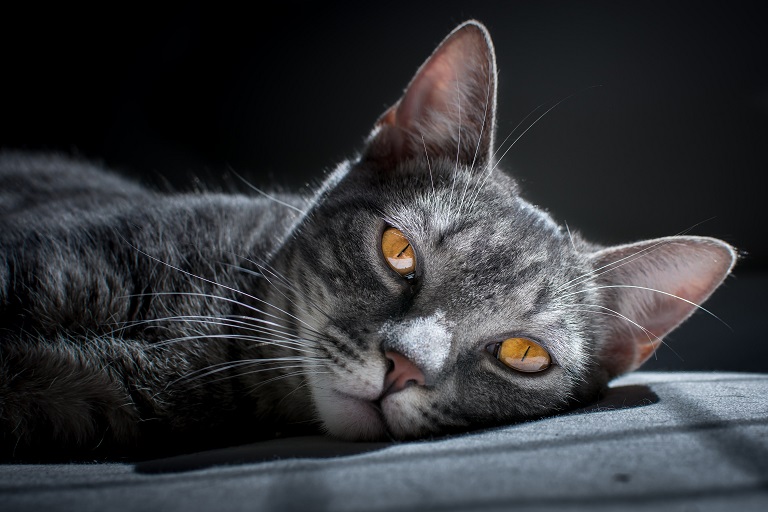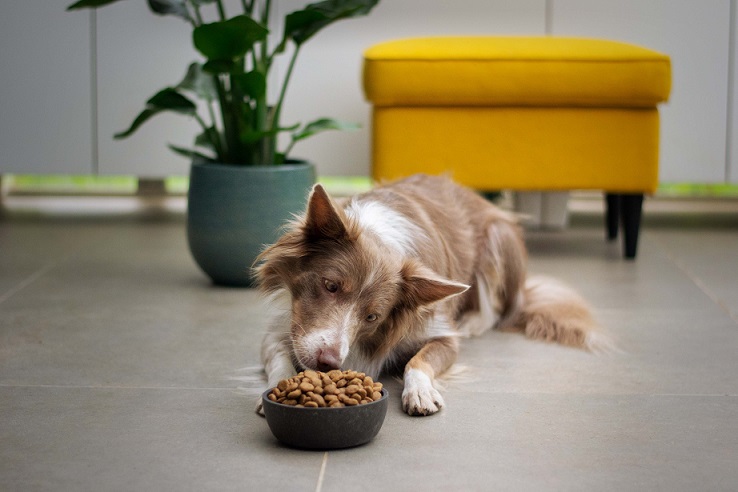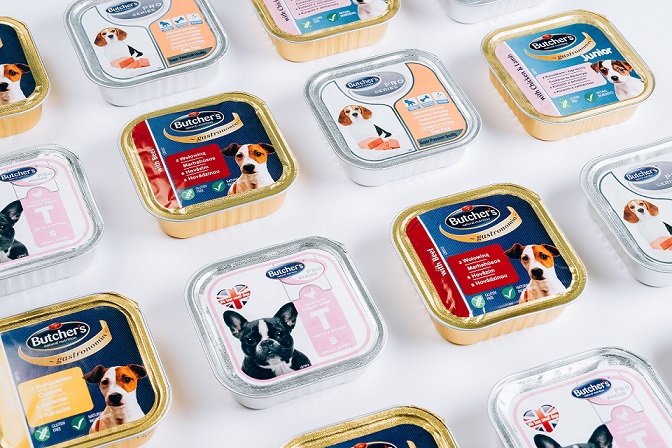Cat Food Allergies are a common problem that affects many cats, as studies have shown that it is the third most common type of feline allergy with the others being environmental allergies, . In this article, we provide the Best Allergy Meds for Cats to help you Treating Cat Food Allergies and get your feline friends on the road to health.
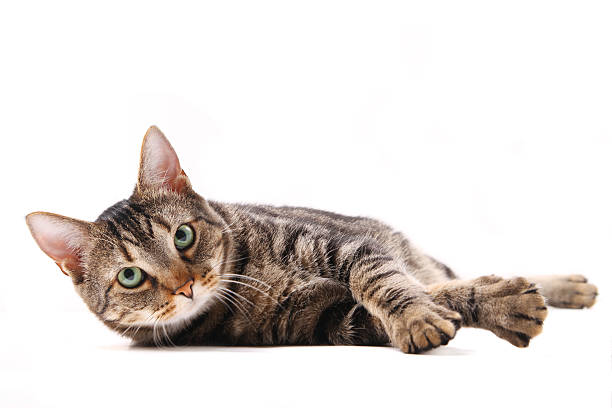
What Are Food Allergies in Cats?
Food allergies in cats are a reaction to only tiny amounts of an ingredient in a particular food, such as dairy products, fish, or beef. Although allergies are often diagnosed in young cats, they can affect cats at any age. So, it’s worth getting any unusual symptoms checked out at any age. With this said, it is important to say that Cat Food Allergies are very difficult to diagnose, as there are no allergy-specific tests available. Moreover, symptoms do not usually indicate what caused the illness as triggers can be inconsistent.
What Are the Signs and Symptoms of a Cat Allergy?
Not minding the difficulties with diagnosing Cat Food Allergies, and though there are many cat food allergy symptoms, there are typical symptoms of Cat Food Allergies that can help. These include:
- Skin problems: this is quite common with cats suffering from food allergies. They would usually itch and have redness, bald areas, or actual abrasions of the skin. This is usually caused by the cat scratching themselves.
- Recurrent ear infections: cats with food allergies experience ear infections that are recurrent.
- Fur ball problems: this symptom arises from cats swallowing fur when scratching/over-grooming themselves.
- Gastrointestinal problems: cats with food allergies experience gastrointestinal problems which include vomiting and diarrhea.
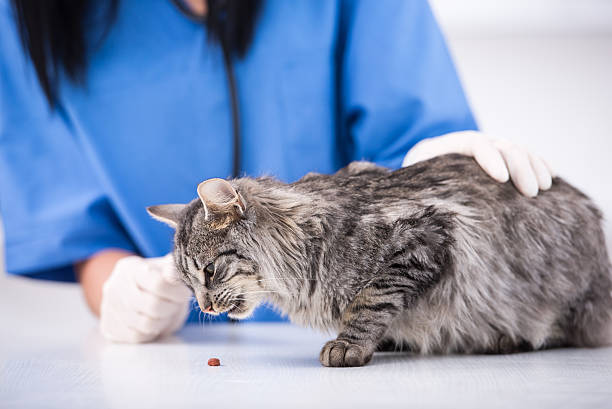
What Should I Do if I Think My Cat Has Food Allergies?
As we said earlier, it is not easy to determine when our cats are suffering from food allergies. This is because, among others, there could be more than one food type responsible for your pet’s cat food sensitivity and allergy. This is why it’s so important to get your vet involved, and not try to do the detective work yourself.
It can be a tough process, but it will be worth it in the end when your pet cat can happily take to her dinner without you worrying about any unpleasant after-effects. Given that there are so many different kinds of cat food allergies common among cats, your vet can help diagnose the cause of your cat food sensitivity and determine the appropriate treatment.
So, if you are concerned that your cat may have an allergy to cat food, consult your vet straight away!
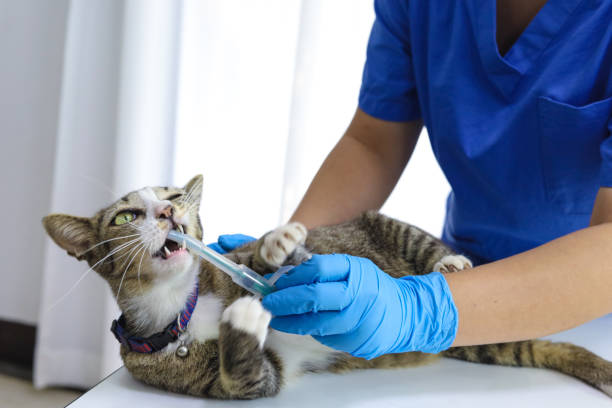
How can Vets test for Cat Food Allergies?
If after reporting your observation to your vet and your vet suspects your cat has an allergy, your cat will probably be recommended to start an exclusion diet trial. This means that you will temporarily feed your cat a bland, hypoallergenic cat food as a diet, where the proteins in any ingredients are so small they can’t (or very rarely) cause an allergic reaction.
The exclusion diet will last a fixed period, depending on your cat’s symptoms. If, for example, your cat is experiencing cat skin problems, your cat may be given a restricted diet for 4 to 12 weeks, or sometimes longer. Gastrointestinal problems, however, show signs of improvement in a shorter time frame.
Although your vet will likely inform you of this, it is important to know that while your cat’s on the exclusion diet (hypoallergenic cat food) they mustn’t eat anything else. This means no special treats from anyone in the family, no matter how tempting it may be! Outdoor cats are best kept indoors during the trial.
It is important for you to know that it takes patience and perseverance to stick to the exclusion diet trial. This is particularly pertinent to know as there may be occasional slip-ups in ensuring that your cat keeps to the diet. If there are any slip-ups, be honest with your vet, as they need to know all the facts, including any refusals by your cat to eat the bland diet.
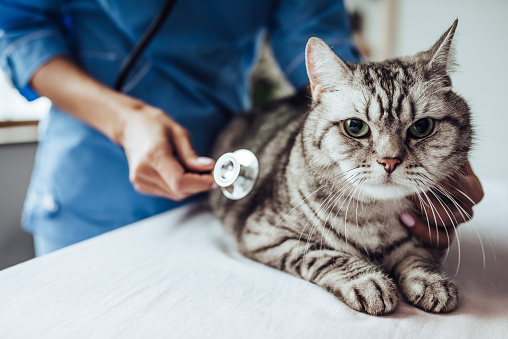
How Are Cat Allergies Diagnosed?
To diagnose allergy food intolerance in cats, your vet will review your cat’s medical history and complete a physical exam. Cat allergy testing is done with either a blood test or a skin test. For a blood test, the vet will take a sample of the cat’s blood and send it to a lab for evaluation. For a skin test, small injections are given to the cat just under the skin.
After the Trial Period
At the end of your diet trial, your vet will check your cat to see how she/he is doing. In particular, your vet will want to know if symptoms have improved, changed, or remained the same. If there has been no improvement and your pet doesn’t have a food allergy, it is likely that something else is causing she/he not to feel good.
If however there has been an improvement, that’s good news! Your vet will discuss what happens next but, depending on your cat’s specific problems, it may involve slowly reintroducing proteins to their diet one by one and keeping a close eye on the cat’s response. If the symptoms return when your cat eats a particular food with particular ingredient, you may have found the source of the allergen.
If this happens, It’s then a case of finding a different, nutritionally balanced diet, in the long- or short-term, that avoids food with the ingredient.
Treating Cat Food Allergies
Are there treatments for cat food allergies? The treatment of food allergy in cats can target the source of the cat food sensitivity or the cat food allergy symptoms. So, for instance, with the itching, you can bathe your cat to relieve the itching. The ultimate in treating cats with food allergies is to provide your cat with a healthy and balanced diet while avoiding the most common cat food allergies. Avoiding these common cat food allergies helps you answer the question of what food is good for cats with allergies? In some cases, your vet may provide your cat with a daily prescription or dietary supplements.
In treating food allergies cat, most cat owners worry about how long for cat food allergies to go away. It may take some time for your cat to be free of the allergic reaction, But the assurance is that if you follow the recommendations above, you’re sure are on the path to getting your cat back to health again.
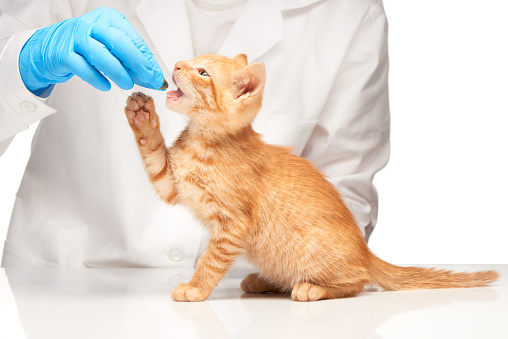
Best Allergy Meds For Cats
Ultimately, the correct treatment for your cat’s allergies will depend on its underlying cause and will be determined once that cause is identified. Relief from the inflammation, itchiness, and hair loss can come from a variety of prescribed pet medicine that ranges from chewables, tablets or pills, liquids or topicals, or an injection.
Prescription cat allergy medicine is an excellent way to treat your cat’s allergies. A visit to your vet’s office will help you and your vet create a custom plan to care for your cat. This is because your vet is familiar with the best allergy medication for cats and can help you choose the best option for your cat. Corticosteroids or antihistamines can provide your cat with relief from their most bothersome, irritating symptoms. Listed below are some of the best allergy medicine for cats; but they should only be administered with your vet’s prescription.
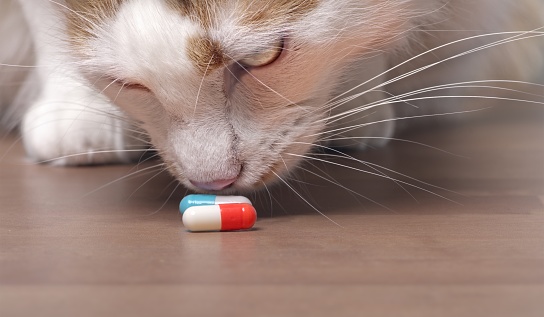
Are there Meds for Cats with Allergies?
According to Dr. Wooten, “Antihistamines are the most common OTC option used to help a cat with allergies, and the most common antihistamine used in cats is chlorpheniramine — estimated to help 10 to 50 percent of cats that suffer from allergies.” But you must talk with your vet for dosage.
Some of the most common medications include Cortisone pills (itch medicine), Lotions, ointments, ear drops, or eye drops. It is important to always talk to your vet before giving a new medication to your cat.
- Hydroxyzine (Pamoate or HCL) – This cat allergy medicine has many uses, including the relief of allergic and inflammatory conditions like stings and bites. This antihistamine also helps relieve skin itch.
- Prednisone – These oral cat allergy pills are corticosteroids with anti-inflammatory properties to treat inflammatory eye conditions, allergic reactions like asthma or hives, and other allergy symptoms.
- Dexamethasone – This corticosteroid is a useful treatment for severe allergies, skin conditions, and more.
- Cyproheptadine – This cat allergy medicine is an appetite-stimulating antihistamine.
- Atopica – An oral solution, this revolutionary treatment is effective against atopic dermatitis, which is the most common allergic skin condition in cats.
- Mupirocin – This antibiotic ointment inhibits bacterial growth, helping to heal a variety of skin infections that can result from allergic conditions.
Some Final Words
For some final words, there are a number of prescription medications and antihistamines for cats that help treat food allergies in cats and soothe the discomforts they may experience with the allergies. Each can be given orally and is available in capsules or tablets form for cats, and other pets. While most work to control symptomatic itching, there are some differences. The very important thing to know in using meds is that it is best effective with proper advice from your cat’s vet.
If you find this piece helpful, I would like to hear from you about other remedies – homemade recipes, for instance – that you think are helpful for cats experiencing food allergies.


